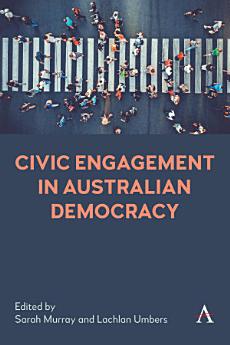Civic Engagement in Australian Democracy
Sarah Murray · Lachlan Umbers
2025年5月 · Anthem Studies in Australian Politics, Economics and Society 第 1 本图书 · Anthem Press
电子书
234
页
family_home
符合条件
info
report评分和评价未经验证 了解详情
关于此电子书
The Australian democratic system has long been regarded as one of the most stable and predictable in the world, with an entrenched two-party duopoly, compulsory voting ensuring high levels of electoral participation and relatively high levels of satisfaction with the democratic process. Yet the ways Australians engage with, and participate in, their democracy have shifted substantially in recent times. While a record proportion of Australians are now on the electoral roll, less than 1% belong to a political party, and the share of Australians that have always voted for the same party in Federal elections has declined from 72% in 1967 to 37% in 2022. Turnout in the 2022 Federal Election fell below 90% for the first time since the introduction of compulsory voting in 1924. Over 50% of voters cast their ballots early in 2022, up from around 10% in 2004. The advent of social media has afforded Australians a range of opportunities for political engagement but has also given rise to serious concerns surrounding the dissemination of misinformation. And Australians have also recently been afforded several historically rare opportunities for direct participation in the lawmaking process – particularly, the 2017 same-sex marriage plebiscite and the 2023 referendum on the Aboriginal and Torres Strait Islander Voice to Parliament.
These developments give rise to a wide range of deep, difficult questions for Australian democracy, many of which have been under-explored. What, for instance, does the failure of the referendum on the Aboriginal and Torres Strait Islander Voice to Parliament mean for Australian democracy? What sorts of opportunities ought to be afforded to Australians for direct participation in government? How might climate change impact Australian democracy in the coming decades? How might the rise in early voting impact the character of Australian democracy? What opportunities do Australians have for engagement in civic life, and what obstacles do they face in exercising them?
This edited collection brings together specialists in the democratic process to consider such questions, alongside many others. Moreover, the collection is uniquely interdisciplinary, insofar as the contributors are drawn from a diverse range of fields – law, philosophy, political science and sociology. The chapters each help bring us a broader understanding of civic participation in Australian democracy, in order that we might evaluate the status quo, and gauge where it might be headed, in the future.
These developments give rise to a wide range of deep, difficult questions for Australian democracy, many of which have been under-explored. What, for instance, does the failure of the referendum on the Aboriginal and Torres Strait Islander Voice to Parliament mean for Australian democracy? What sorts of opportunities ought to be afforded to Australians for direct participation in government? How might climate change impact Australian democracy in the coming decades? How might the rise in early voting impact the character of Australian democracy? What opportunities do Australians have for engagement in civic life, and what obstacles do they face in exercising them?
This edited collection brings together specialists in the democratic process to consider such questions, alongside many others. Moreover, the collection is uniquely interdisciplinary, insofar as the contributors are drawn from a diverse range of fields – law, philosophy, political science and sociology. The chapters each help bring us a broader understanding of civic participation in Australian democracy, in order that we might evaluate the status quo, and gauge where it might be headed, in the future.
作者简介
Sarah Murray is a Professor at the University of Western Australia Law School and is an expert in constitutional law and electoral law, court innovation and community justice centers.
Lachlan Umbers is Senior Lecturer and Chair of Philosophical Studies at the University of Western Australia. He works primarily in moral and political philosophy, with a particular focus upon issues in democratic theory and climate justice.
为此电子书评分
欢迎向我们提供反馈意见。
如何阅读
智能手机和平板电脑
笔记本电脑和台式机
您可以使用计算机的网络浏览器聆听您在 Google Play 购买的有声读物。
电子阅读器和其他设备
如果要在 Kobo 电子阅读器等电子墨水屏设备上阅读,您需要下载一个文件,并将其传输到相应设备上。若要将文件传输到受支持的电子阅读器上,请按帮助中心内的详细说明操作。





